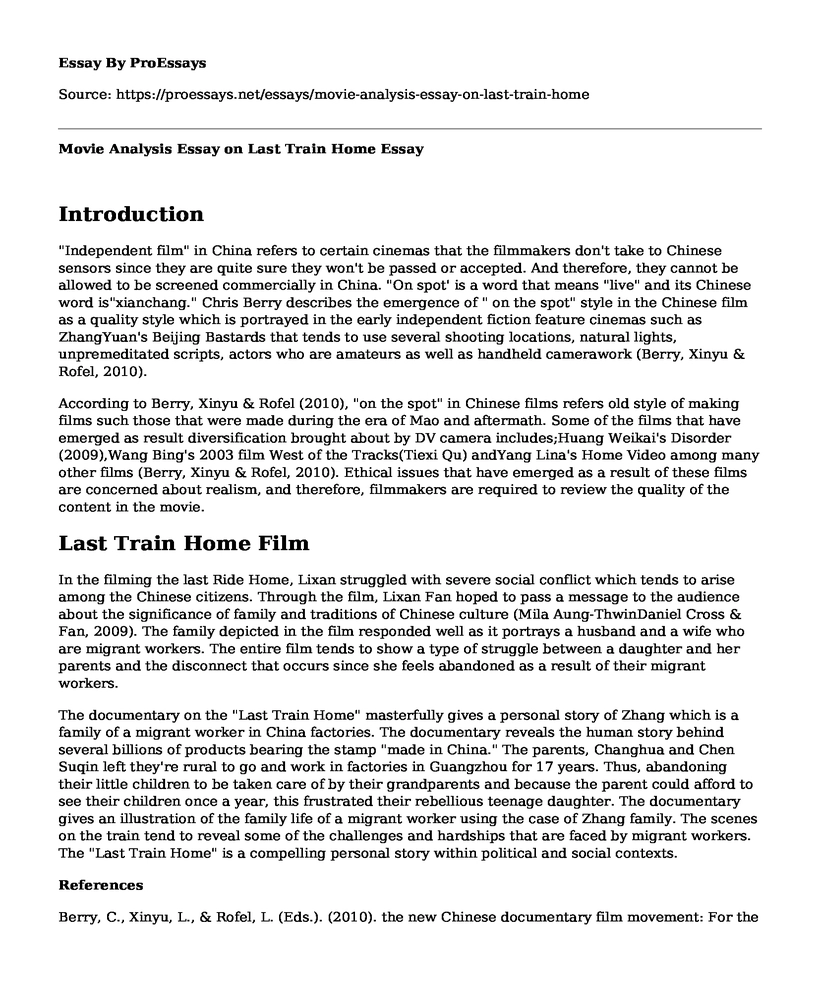Introduction
"Independent film" in China refers to certain cinemas that the filmmakers don't take to Chinese sensors since they are quite sure they won't be passed or accepted. And therefore, they cannot be allowed to be screened commercially in China. "On spot' is a word that means "live" and its Chinese word is"xianchang." Chris Berry describes the emergence of " on the spot" style in the Chinese film as a quality style which is portrayed in the early independent fiction feature cinemas such as ZhangYuan's Beijing Bastards that tends to use several shooting locations, natural lights, unpremeditated scripts, actors who are amateurs as well as handheld camerawork (Berry, Xinyu & Rofel, 2010).
According to Berry, Xinyu & Rofel (2010), "on the spot" in Chinese films refers old style of making films such those that were made during the era of Mao and aftermath. Some of the films that have emerged as result diversification brought about by DV camera includes;Huang Weikai's Disorder (2009),Wang Bing's 2003 film West of the Tracks(Tiexi Qu) andYang Lina's Home Video among many other films (Berry, Xinyu & Rofel, 2010). Ethical issues that have emerged as a result of these films are concerned about realism, and therefore, filmmakers are required to review the quality of the content in the movie.
Last Train Home Film
In the filming the last Ride Home, Lixan struggled with severe social conflict which tends to arise among the Chinese citizens. Through the film, Lixan Fan hoped to pass a message to the audience about the significance of family and traditions of Chinese culture (Mila Aung-ThwinDaniel Cross & Fan, 2009). The family depicted in the film responded well as it portrays a husband and a wife who are migrant workers. The entire film tends to show a type of struggle between a daughter and her parents and the disconnect that occurs since she feels abandoned as a result of their migrant workers.
The documentary on the "Last Train Home" masterfully gives a personal story of Zhang which is a family of a migrant worker in China factories. The documentary reveals the human story behind several billions of products bearing the stamp "made in China." The parents, Changhua and Chen Suqin left they're rural to go and work in factories in Guangzhou for 17 years. Thus, abandoning their little children to be taken care of by their grandparents and because the parent could afford to see their children once a year, this frustrated their rebellious teenage daughter. The documentary gives an illustration of the family life of a migrant worker using the case of Zhang family. The scenes on the train tend to reveal some of the challenges and hardships that are faced by migrant workers. The "Last Train Home" is a compelling personal story within political and social contexts.
References
Berry, C., Xinyu, L., & Rofel, L. (Eds.). (2010). the new Chinese documentary film movement: For the public record (Vol. 1). Hong Kong University Press
Mila Aung-ThwinDaniel Cross & Fan, L. (2009). Last Train Home. Canada: Eyesteel film.
Cite this page
Movie Analysis Essay on Last Train Home. (2022, Nov 22). Retrieved from https://proessays.net/essays/movie-analysis-essay-on-last-train-home
If you are the original author of this essay and no longer wish to have it published on the ProEssays website, please click below to request its removal:
- Film Analysis Essay on Polluting Paradise: Environmental Issues Portrayed in the Film
- Musical Theatre: The Black Crook Essay
- Essay Sample on Social Media Cites as Important Means of Communication
- Love, Sex and Desire in French Movies and Novels Essay Example
- Paper Example on Granny's Got Game: Uplifting Old-Age Tales of Basketball Teams
- Free Paper Sample: US Healthcare System: Access, Rights & Changes
- Public Health Care: Debates, Challenges & Solutions - Essay Sample







